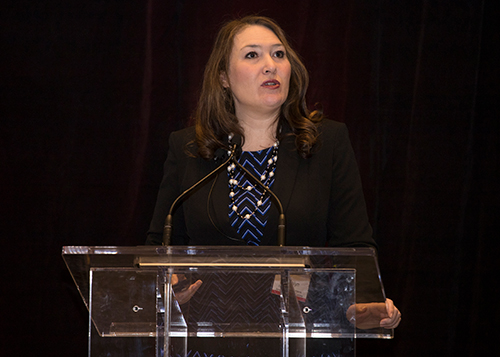

The vast amount of variation in a disease such as lung cancer often signals different treatment options for patients. At the Employers Cancer Care Summit in February, Dr. Rosalyn Juergens, chair of the lung cancer disease site team and head of the department of clinical trials at the Juravinski Cancer Centre, spoke about some of the treatment scenarios.
“What you . . . see, for example, if you look at adenocarcinoma of the lung, is there’s actually quite a wide range of the rates of mutation. And that actually speaks to the fact that lung cancer isn’t one big disease, it’s not all smoking related. There’s quite a variety,” Juergens told the crowd at the One King West hotel in Toronto on Feb. 27.
Read: A primer on the role of drug access navigators
“Now we know about nearly a dozen different mutations, and these mutations identify very distinct patterns and very distinct treatment options for different lung cancer patients. So when you talk about lung cancer, it’s not one disease; there are multiple different subgroups of diseases,” she added, noting the power of some of the new treatments.
As part of her presentation, Juergens showed a chest X-ray of a patient who saw a drastic reduction in evidence of the disease after just a week of treatment. “That’s the power with which some of these tablets can work and the power with which personalizing treatment and getting the right treatment to the right patient at the right time can really provide.”
Juergens also spoke about the effectiveness of ALK inhibitors, which led to the near resolution of all symptoms for one patient who had tumours in her brain. She noted the importance of such treatments for both the patient and the caregiver, as both were able to return to work and care for their children.
“The median time that these people live with tablet treatment is over four years,” she said, referring to certain lung cancer patients. “So these patients have longevity. Just because you have lung cancer doesn’t mean that you necessarily have an immediate death sentence.”
Read: The employer’s role in being ‘a very strong motivator’ in cancer patients’ return to work
Another effective treatment, according to Juergens, is immunotherapy. She shared the case of a firefighter who went onto immunotherapy after exhausting other options and who’s now in remission.
Juergens reminded the crowd that access to these novel treatment agents is “critically important” and that many provinces don’t offer coverage. “We know in Ontario we have the young and the old, but most people in the workforce are the ones who are uncovered and we have very good treatments that can allow these people to continue to work. And you know what? Not all of the folks think about the impact on the quality of life when they’re choosing the different treatment options that are available and just because it’s cheapest doesn’t mean it’s better,” she said.
Read more coverage of the 2018 Employers Cancer Care Summit here
